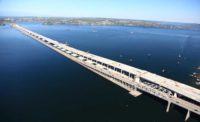Three of six Washington and Oregon coal-port proposals are dead. Three plans remain: two along the Columbia River—one in Oregon, the other in Washington——and another near Canada, north of Bellingham, Wash.
Proposals in Grays Harbor, Wash., Coos Bay, Ore., and, most recently, St. Helens, Ore., have all been killed.
Houston-based energy giant Kinder Morgan is the latest to drop out, suspending coal-terminal plans at the Port Westward Industrial Park at the Port of St. Helens. The $200-million project—still in a due-diligence phase prior to permitting—was yanked because site logistics were too difficult, says Allen Fore, Kinder Morgan spokesman.
Conservation groups and even Portland General Electric fought the site northwest of Portland along the Columbia River because of the prospect of 30 million tons of coal annually traveling on trains from the Powder River Basin region of Wyoming and Montana.
Fore says Kinder Morgan will continue looking for a West Coast site.
Two sites directly on the Pacific Ocean were scrapped earlier: Grays Harbor, Wash., and Coos Bay, Ore.
Of the three remaining U.S. proposals, Australia-based Ambre Energy's $242-million Boardman coal barge-to-train facility at the Port of Morrow in eastern Oregon is furthest along. Ambre is pushing for approval of an air permit application, filed 15 months ago with the Oregon Dept. of Environmental Quality.
Millennium Bulk Terminals has announced an agreement with local union workers to construct a $643-million terminal west of Longview, Wash., north of Portland along the Columbia River. Permitting for exporting an eventual 44 million metric tons of coal has just entered the early scoping stage of the environmental impact statement review, according to the Washington Dept. of Ecology.
SSA Marine's Gateway Pacific Terminal would handle 54 million metric tons per year, mostly coal, from a deepwater terminal at Cherry Point, Wash. The state expects to release a draft EIS in 2014.


